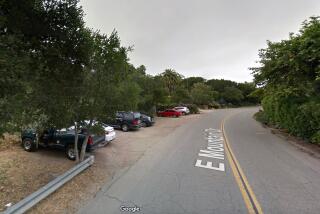Officials, Family Battle Over Teepee : Claremont: Rather than purchase a $150 city permit, the owners have removed the structure. The incident has sparked a community controversy.
- Share via
The Little tepee is not small. It stands about 18 feet high and towers over the white picket fence that borders Edward F. Little’s yard at 1170 Indian Hill Blvd. in Claremont.
The Littles would erect the tepee whenever their nieces and nephews came to visit, or for occasional educational field trips for school groups.
So for the past 30 years, neighbors caught occasional glimpses of children playing in front of the buffalo painted on its canvas sides as they pulled into their driveways.
But on Jan. 7, the Littles received a letter from the Community Development Department stating that the tepee “detracted from the character of our neighborhoods” and violated the city’s land use and development code.
The department issued an ultimatum: Take down the tepee, purchase a $150 permit for an “unattached accessory structure,” or face a fine. The Littles complied and removed the tepee, but the incident has sparked a community controversy.
“(The tepee) doesn’t bother a soul except bureaucrats and people who think they should run our lives for us,” said Conrad Casler, a neighbor who wrote a letter to the Claremont Courier to protest the city’s action.
“The real ironic thing is that the city doesn’t want a tepee on Indian Hill Boulevard,” said Casler, a 64-year-old retired journalist, who noted that the Cahuilla Indian tribe used to live on the real Indian Hill about three blocks away from Little’s house.
Courier Publisher Martin Weinberger added that the tepee has been embroiled in controversies previously.
“In the ‘60s, we used the tepee in a Fourth of July celebration, and city officials told us we had to take it down. They thought it might be interpreted as a Communist protest of the Vietnam War,” he said.
This time, the issue is more a matter of codes than politics.
“This has nothing to do with whether it’s a tepee or a yurt or an igloo,” said Sharon Wood, director of community development. “It was an accessory structure without a permit, and it was up for a month, and it was large and visible from the public right of way.”
Wood explained that when one of the Claremont Colleges wanted to erect a yurt a few years ago--a Mongolian tentlike structure--the students had to apply for and buy a $150 special use and development permit.
“If he had applied for a permit, there would have been no problem. If he had left it up for just a weekend, we probably wouldn’t have bothered,” she said. “But it was up for a month, and many of us on staff kept driving by and seeing it.”
The Little tepee’s big controversy has left family members pondering why the community is making such a fuss.
“At this point, I haven’t dealt with it, but at some point I’ll go down to City Hall and talk to them. So far, it’s been a basic laugh for me,” said Lance Little, who inherited the tepee from his father Edward, who built it.
The tepee remains at his father’s house, but Lance started putting it up and taking it down when his father tired of the chore.
“We put it up for my niece and nephew over Christmas. We can’t leave it up all the time, anyway--it’s too hard on the canvas. Well, I got busy and didn’t take it down, and about the time I was ready to take it down, we got the letter,” said Little, 41, who owns a garage door-installation business in Upland.
More to Read
Sign up for Essential California
The most important California stories and recommendations in your inbox every morning.
You may occasionally receive promotional content from the Los Angeles Times.













